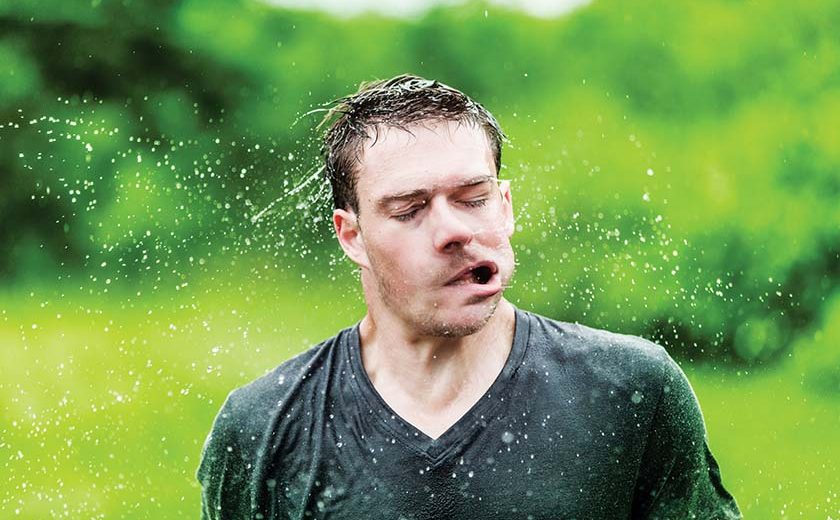Sweating, also referred to as perspiration is a natural process, where in glands in our body, the so called “sweat glands” release a fluid that is high in salt along with some fractions of minerals and oil.

Abraham Mathew Saji
Pharmacist
It is the body’s natural temperature regulation system.We are all born with numerous sweat glands, ranging from about 2 to 4 million of them, which are at their active best during puberty. In general, women tend to have more sweat glands than men, but the men’s sweat gland are generally more active. These sweat glands are located all over our body, and their activity is beyond our control; rather they are controlled by the nervous system. The nervous system responds to either external stimuli (e.g. high temperature) or internal stimuli (e.g. related to emotional situations like anger, stress, nervousness, anxiety) that can raise the body temperature and cools it down. What a wonderful mechanism that we are all gifted with!
Types of Sweating
The most common areas of sweating are forehead and parts of the face, armpits, palms of our hands, neck, abdominal areas around the groin and soles of our feet. The normal amount of sweat produced per person will vary based on age, sex, amount of physical activity, temperature exposure conditions and emotional state of mind, to name a few, but can be as much as a quart of fluid per day 1, 2.
Less sweating, also referred to as “anhidrosis” can result in excessive body heating, can lead to dehydration and increase your risk of getting a stroke.
Excessive sweating also referred to as “hyperhidrosis” can be more a cause of psychological problem than physical; more so when it is accompanied with bad odour. Body odour too, like sweating, can vary within individuals. Hyperhidrosis can be the cause of overactive sweat glands that are capable of producing about four to five times more sweat than is normally required on certain areas of the body like forehead, armpits, palms, groin and soles. This condition when not accompanied with any medical condition is referred to as primary hyperhidrosis. It can be referred to as secondary hyperhidrosis, when it can be related to certain medical conditions, the consumption of certain medications or due to hormonal changes.
Sweat Glands
Our body has two types of sweat glands beneath the skin, namely eccrine and apocrine glands.
- The eccrine sweat glands are distributed throughout the body and open directly onto the surface of the skin. With a rise in temperature, these eccrine glands secrete sweat that is high in salt and water onto the surface of the skin, which helps to cool the body and eventually evaporates and dries off.
- The apocrine sweat glands are abundant areas with high amount of hair follicles, like groin and armpit; and they do open directly onto the hair follicle and eventually onto the skin surface. With a rise in temperature or a change in emotional condition, these apocrine glands secrete sweat that is much more viscous and milky as compared to that from the eccrine glands, which is not as easy to evaporate and dry off. This sweat is actually odourless until it comes in contact with the flora and fauna of bacteria found normally on our skin.
Body odour
Body odour, or bromhidrosis, is an unpleasant smell that can be generated by our body, when certain bacteria that thrive on our skin surface break down the protein in our sweat secretions into ammonia and aromatic fatty acids. Body odour can be characteristic or unique to an individual depending on the level of pheromones secreted; also not to underestimate the fact that men can have a much stronger body odour due to testosterone hormone levels.
Body odour usually begins showing up when one reaches puberty or in one’s teens. The type and extent of body odour can be aggravated by consuming high protein or spicy food, being overweight, hormonal changes, certain medications and also certain medical conditions. Sweat or our perspiration fluid, by itself does not have any odour. It is the micro-organisms that grow and proliferate (causing breakdown of sweat into acids) in sweat that is the cause of the odour. Two types of acids are mostly the cause of body odour namely, propionic acid and isovaleric acid. Propionibacteria present in the ducts of the sebaceous glands of adults break amino acids down to produce propionic acid. This propionic acid, due to its chemical closeness to acetic acid is the cause of some people having a vinegar-like smell. The other acid, isovaleric acid is produced by the bacteria Staphylococcus epidermidis which is present in the epidermal layer of the skin.
Although sweating is a normal process of temperature regulation by our body, we may need to seek medical intervention in cases where:
- you begin to get cold sweats,
- you suddenly begin sweating much more than you normally do,
- you begin getting night sweats,
- change in perceived body odour, which could be due to the development of some underlying medical condition,
- you experience sweating accompanied with chest pain, shortness of breath, blackouts or dizziness,
- you experience profuse sweating along with a rapid, pounding heartbeat,
- you experience constant continued perspiration for prolonged or extended periods of time, as compared to your normal routine sweating,
- you experience significant weight loss due to excessive or prolonged sweating,
- you experience sweating only on one side of the body, referred to as asymmetrical sweating,
- you do not sweat even when exposed to high external temperatures or during sessions of high physical activity.
Your healthcare provider or doctor would do a series of investigations to diagnose the root cause of the condition and suggest appropriate measures to overcome them.

How to Manage Body Odour
The best way to manage body odour is to keep areas of the body that are prone to sweating clean and free of micro-organisms. Use soap to wash every day, paying particular attention to the areas that produce the most sweat, such as armpits, genital area and feet. Washing removes sweat and reduces the amount of bacteria on your skin. Changing and washing of clothes regularly can also help.
Using antiperspirants or deodorants on a regular basis too can help prevent body odour. Antiperspirants actually work by reducing the amount of sweat produced by the body. Deodorants work by the use of perfume to mask the unpleasant smell of sweat. Regular shaving of the armpits can also help reduce body odour. The hair in the armpits is prone to trap sweat and heat, providing ideal conditions for bacteria to multiply. In very severe cases of body odour, surgery or treatment with botulinum toxin may be possible options.
Sweating is a natural regulation phenomenon performed by our body that is controlled by our nervous system. But too much or too little of it can eventually be a cause of concern. So, rather than doing nothing and sweating about the problem, seek expert advice when it is due.
References:
1) Sweating; National Institutes of Health; May 29, 2011.
2) Erica Roth; Sweating (Normal Amounts); Healthline; 2014; Part 1 of 5.
Abraham Mathew Saji is a pharmacist by qualification, engaged in research and development of medicines and their implications on the human body. He is an avid reader in pursuit of knowledge and understanding of technological advancements in the medical and pharmaceutical world. He is even more passionate about sharing his acquired knowledge, which he does by speaking at conferences, lectures and writing. He can be contacted at maz31abr@gmail.com for any clarification


